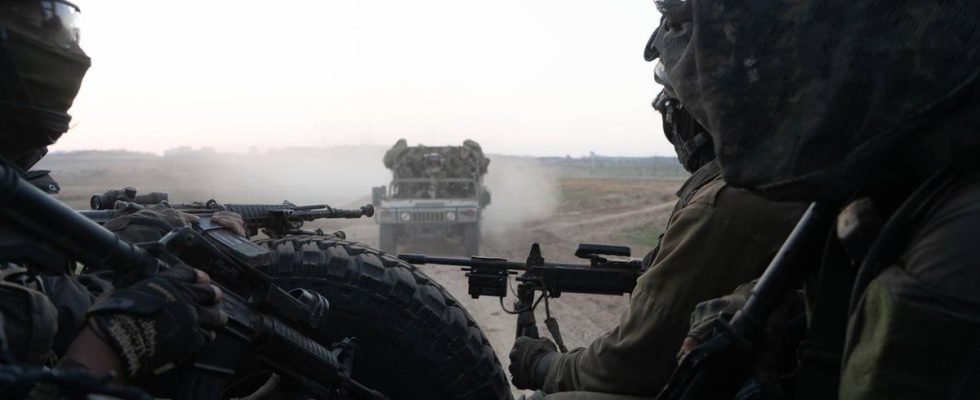To better understand the latest events in the conflict between the Palestinian Islamist movement Hamas and Israel, 20 minutes takes stock every evening. Between the strong declarations, the diplomatic advances or the dramatic results of the fighting, here are the main points of the day.
The fact of the day
It is no longer only the north of the Gaza Strip which is affected by the Israeli army’s ground offensive. Dozens of Israeli tanks, troop transports and bulldozers entered the south of the besieged Palestinian enclave on Monday. The Israeli army is now expanding its ground operations throughout the Gaza Strip, almost two months after the start of the war. The army claimed to be acting “with force” in Khan Younès, a large city in the south where some of the displaced civilians are crowded.
Since the resumption of fighting on December 1 after a seven-day truce, the army has intensely shelled the south of the territory, causing many deaths and injuries among the inhabitants of this region and the civilians who came to take refuge there, trapped in an increasingly restricted scope. “The tanks are now on the Salaheddine road”, which crosses the small coastal territory from north to south, and are cutting the road “firing bullets and tank shells against all the cars and people trying to move”, says Moaz Mohammed, 34 years old. “The fighting and the ground advance of the Israeli army in the Khan Younes area do not allow civilians to move” on the Salaheddine road, in the north and east of the city, the army confirmed .
The number of the day
3. This is the number of cases hanging over Benjamin Netanyahu’s nose. The corruption trial of the Israeli Prime Minister has resumed in Jerusalem, about two months after its suspension due to the bloody attack by the Palestinian Islamist movement on October 7. At 74, he is answering for corruption, fraud and breach of trust in three cases, accusations he denies.
Benjamin Netanyahu is suspected of trying to secure favorable coverage from the Walla news site in return for government favors that could have brought hundreds of millions of dollars to Shaul Elovitch, who was head of both the leading Israeli telecommunications group Bezek and Walla.
In another case, he is suspected of having received large quantities of gifts worth around 700,000 shekels (around 176,000 euros) from wealthy personalities. These bribes took the form of cigars, bottles of champagne and jewelry distributed between 2007 and 2016.
Sentence of the day
I arrived in Gaza, where the suffering of the population is intolerable”
The president of the International Committee of the Red Cross (ICRC), Mirjana Spoljaric, arrived in the Gaza Strip. She plans to go to Israel “in the coming weeks”, the ICRC then indicated in a press release, accused of doing too little for the hostages in Gaza but also for the Palestinian prisoners.
“I reiterate our urgent call for civilians to be protected under the laws of war and for aid to enter unhindered. The hostages must be released and the ICRC allowed to visit them safely,” she wrote on the social network X. “The level of human suffering is intolerable. It is unacceptable that civilians have no safe place to go in Gaza, and with a military siege in place, there is also no adequate humanitarian response possible at this time,” she said. noted.
Today’s trend
Israeli and Palestinian representatives exchanged mutual accusations of “genocide” over the Gaza war at the United Nations Human Rights Council in Geneva, on the eve of the 75th anniversary of the Convention on the Prevention and Punishment of crime of genocide.
” The attacks [commises par] Hamas on October 7 were motivated by genocidal ideology,” Yeela Cytrin, legal advisor to the Israeli mission in Geneva, told diplomats gathered at the European headquarters of the UN. Palestinian representative Dima Asfour, for her part, considered that “the human-made catastrophe” resulting from the massive bombings and the ground offensive by the Israeli army in the Gaza Strip constituted “a textbook case of genocide”.
Israel’s war against Hamas in the Gaza Strip was repeatedly mentioned during an event organized at the UN Human Rights Council in advance of the 75th anniversary of the Convention on the Prevention and repression of the crime of genocide.
The Convention on the Prevention and Punishment of the Crime of Genocide, adopted on December 9, 1948 by the UN General Assembly, was the first treaty devoted to human rights in the history of the United Nations, before the Universal Declaration of Human Rights. It was adopted in the aftermath of World War II, highlighting the horror of the Holocaust and emphasizing the obligation to prevent and punish such genocidal acts.

